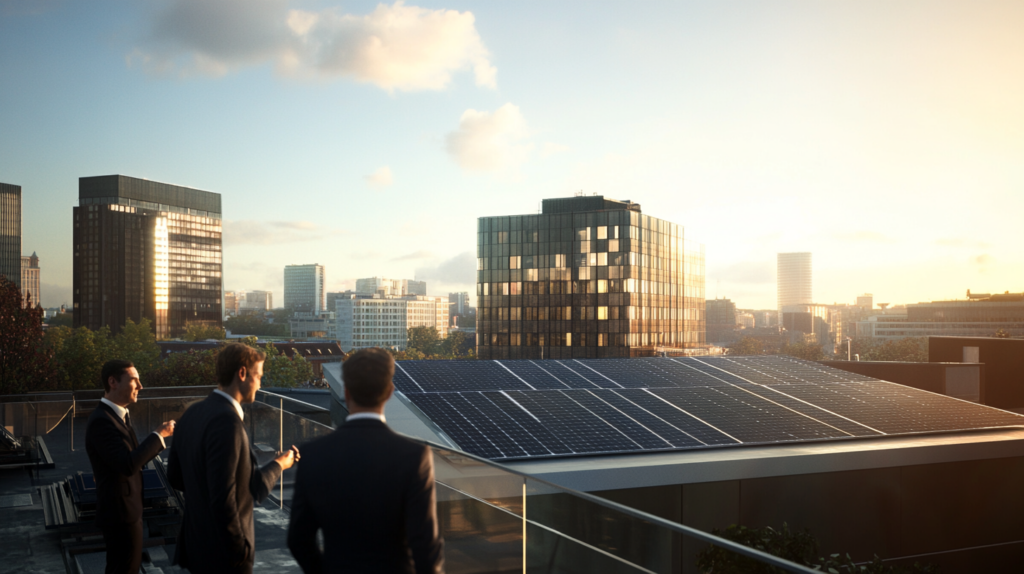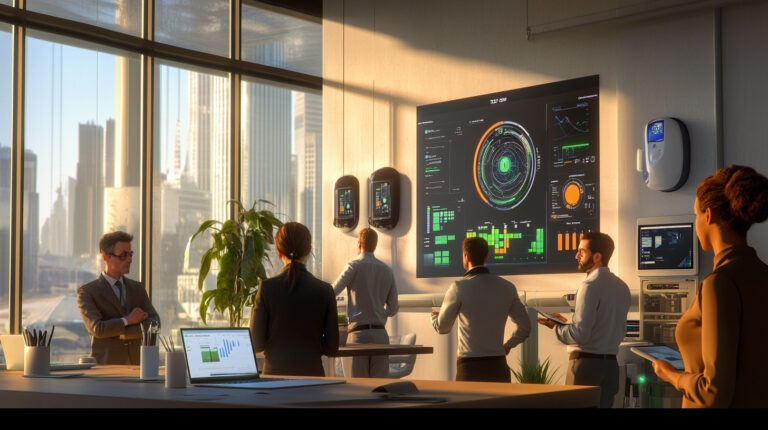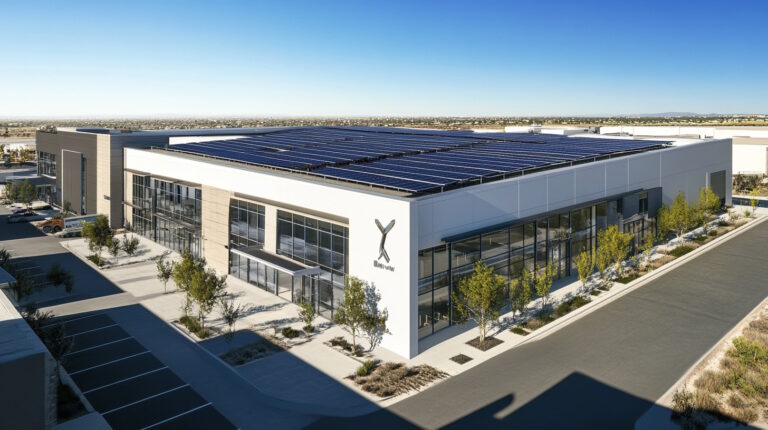Article Insights
– 💡 Discover the potential cost savings with solar for businesses, showing how solar energy can slash your electricity bills.
– 💡 Understand the various benefits of commercial solar energy that could enhance your property’s value and mitigate energy rate hikes.
– 💡 Explore the process of commercial solar panel installation, including types of systems and necessary steps ensuring optimal performance.
– 💡 Gain insights into assessing your property’s viability for solar to determine if it’s a sound investment for your business.
Is Commercial Solar Worth It? A Deep Dive into Solar Energy for Businesses
As the world embraces sustainability, businesses face a pivotal choice: should they transition to solar power?
This decision isn’t just about going green; it’s about enhancing efficiency and reducing operational costs.
As we explore the benefits of commercial solar, the cost savings with solar for businesses, and the ins-and-outs of commercial solar panel installation, you’ll find valuable insights into how solar energy could align with your organizational goals.
Whether you’re aiming to lower monthly expenses or boost your environmental reputation, understanding this technology could be a game-changer.
The Growing Interest in Commercial Solar Energy
A shift towards renewable energy is evident as businesses commit to decreasing their carbon footprint. This movement isn’t purely environmental; it also makes economic sense, especially given the introduction of various industry incentives.
Federal, state, and local governments offer alluring tax incentives and rebates, making commercial solar panel installation more attractive.
Furthermore, an eco-friendly stance can significantly enhance a company’s reputation, drawing in environmentally conscious consumers and investors who prioritize sustainability.
Understanding Commercial Solar Panel Installation
So, what exactly does commercial solar panel installation entail? It involves setting up photovoltaic panels on commercial properties to capture sunlight and convert it into usable electricity.
Businesses have several options: roof-mounted systems, ground-mounted systems, and solar carports.
Each type caters to distinct needs, with unique advantages depending on the business’s property structure and space availability.
Installation processes include comprehensive phases starting with design assessment, followed by engineering, permit acquisition, and then the actual installation, all ensuring the system operates at peak performance.
Key Benefits of Commercial Solar Energy
Going solar brings a myriad of benefits. Firstly, it’s a boon for reducing energy bills. By generating your electricity, especially during peak hours when grid power is costlier, you can see a notable decrease in monthly expenses.
Furthermore, having solar panels can bolster your property value, as properties with sustainable energy solutions are often more attractive to modern buyers and tenants.
This form of energy also offers stability, shielding your business from unpredictable energy rate hikes due to market fluctuations.
Besides these, substantial tax incentives, including the Investment Tax Credit (ITC), can lessen the initial financial burden of solar installation, making this investment even more worthwhile.
Cost Savings with Solar for Businesses
The journey with solar begins with understanding that while the upfront installation investment may appear significant, the savings that follow are indeed substantial.
In many cases, businesses start realizing returns within a few years. Different financial models and options such as leases, Power Purchase Agreements (PPAs), and loans make solar technology accessible without a hefty initial payment.
With solar energy, businesses move closer to energy independence, securing themselves from market unpredictability and enabling steadier budgeting and cash flow.
Moreover, by exploring these options, you often uncover hidden costs tied to traditional energy forms, considering the full spectrum of maintenance, operational expenses, and the reliability solar provides.
This comprehensive view highlights remarkable savings opportunities.
Assessing Your Commercial Property for Solar
Evaluating whether your property is right for solar involves an in-depth site viability assessment. Factors such as sunlight exposure, roof condition, and available space significantly impact the effectiveness of a solar power system.
Beyond this, conducting an energy consumption audit provides essential insights into your current usage, helping estimate the solar power needed and potential savings.
Engaging with skilled solar consultants streamlines this complex process, custom-fitting a solar solution that meets your unique business requirements.
Common Misconceptions About Commercial Solar
There are a few misconceptions we need to address. The prominent one is the perception of high initial costs. Although setting up commercial solar panel installation does require investment, the return often justifies it.
Another myth is that solar panels underperform in cloudy regions. Contrary to this belief, modern panels are adept at generating electricity even in lower sunlight areas.
Lastly, concerns about frequent maintenance are largely unfounded. Solar systems generally demand minimal upkeep, and routine inspections alongside periodic cleaning can notably extend their longevity and efficiency.
Determining Solar’s Fit for Your Business
Aligning solar energy investments with business objectives is pivotal, whether the focus is profit, sustainability, or public image.
A thorough cost-benefit analysis, taking into account energy savings, tax perks, and increased property value, helps reveal if commercial solar panel installation is a strategic financial move for your organization.
For those new to solar, pilot programs offer invaluable insights without the risk of a full-blown commitment.
Charting a Path Towards Solar Energy
The move to commercial solar power is increasingly becoming strategic for businesses aiming to cut back on energy expenses and champion sustainability.
With a favorable landscape of incentives and flexible financing options, adoption is more feasible for companies of all sizes.
By evaluating your energy needs, examining solar capability, and leveraging expert guidance, you pave the way for informed decisions.
As energy trends tip towards renewables, the real question isn’t merely about solar’s worth but what proactive steps you’ll take to capitalize on its potential for your enterprise.
In closing, embracing commercial solar energy offers businesses an exceptional chance to reduce costs significantly while also contributing positively to environmental goals.
As you weigh your options, remember the substantial benefits and savings your business could harness by taking this sustainable leap forward.








